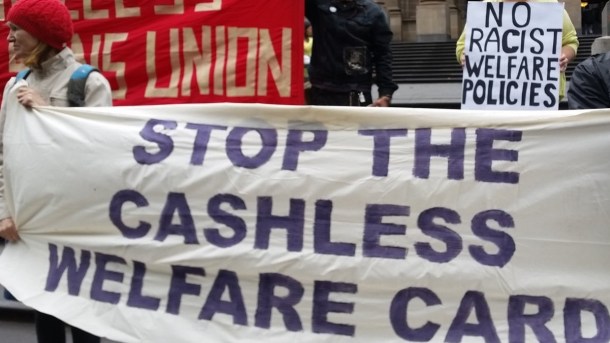Richard di Natale has a simple pitch to the bourgeoisie, “You can trust us, we’ll play by the rules”.
In a puff piece in this weeks’ Australian Financial Review, di Natale and Peter Whish-Wilson are keen to highlight just how trustworthy they really are.
First, they’re keen to point out that as a parliamentary party, they are no longer beholden to Greens members and internal democratic processes:
Greens finance spokesman Peter Whish-Wilson, a former investment banker, has also revealed how the party’s newly operational “lightning” decision group has helped them seal deals with the Turnbull government, some of which one senior Greens source said “would never have happened under [former leader] Christine Milne”.
They are a “new generation of Greens parliamentarians”, who understand and will respect the rules of Australia’s political class:
The first Greens leader not to have spent time in jail for environmental activism, Senator Di Natale said 2015 has seen “a significant transition” for the party since he took over in May. “People have described it as a new generation of Greens parliamentarians,” he said.
They are prepared to work with, rather than against, the established forces of the political class, they are prepared to be “pragmatic”:
After coming under heavy attack from Labor at the end of the year after clinching two major deals over multinational tax transparency and foreign investment in agricultural land, Senator Di Natale said he wants this sort of pragmatism to define his leadership.
Pragmatic is important. The Greens leadership will argue about the merits of this or that compromise from a policy perspective, but what it demonstrates to both the ruling class and Greens supporters is that the inherently anti-environment, anti-worker and anti-social justice forces of the right are no longer beyond the pale as far as the parliamentary Greens party is concerned.
Importantly for a pitch to the ruling class, the Greens are keen to highlight that they are bankable:
Senator Di Natale said he is confident the party can make progress on his aim of two senators in every state this year.
He says the party’s internal figures have shown a 30 per cent rise in membership from the 2013-14 to 2014-15 financial year, from around 10,000 to 13,400 members nationally, and said he believed they had “significant success” in state elections.
2016 is an important year for the Greens.
The Greens have been searching for mainstream acceptability since at least 2004. At the Greens national conference that year Bob Brown finally won the argument for a stronger federal parliamentary party room and a formal party leadership.
The campaign for respectability has reached remarkable depths since 2004. People and policies that might offend bourgeoisie acceptability have been progressively jettisoned. Redistributive justice went by the wayside in 2012, check out Hall Greenland’s account of the Greens 2012 policy conference for some idea of what that involved:
The “party room” (as the federal MPs are called) moved for the deletion of the plank in an abbreviated debate – about ten minutes – in which Bob Brown seized the mike to spell out the reason for the elimination: it was electoral poison and costing us one or two percent of the vote. That was it. Truly.
…
A few hours earlier in a special plenary session called to farewell Bob Brown, both he and his successor, Senator Christine Milne, laid out the strategy of an alliance with what might be dubbed “the green bourgeoisie”, but which is usually referred to as Green businesses. The thinking is that there are firms out there with a real interest in an ecologically sustainable economy and that they can be split away from the Business Council of Australia and the Australian Industry Group to form a capitalist base for the Greens. As one of the leaders said – I think it was Bob Brown – this new alliance will also “afford us new funding opportunities”.
I first joined The Greens in the aftermath of Tampa, today the Greens support the mandatory detention of asylum seekers. Recent developments are the finishing touches on a long-running process.
For ten years many in the Greens have assumed that the next ten percent is out there, they’re just being scared off by this or that non-core promise, person or practice (or mainstream media misrepresentation of the latter!). In 2016 the Greens are expecting a payoff for work towards political respectability.
If the leadership of the Greens seriously believe their bullshit (and there is every reason to suspect they do), the 2016 federal election will be a disappointment for The Greens. A “me-to” minor party cannot substantially change Australian politics. There is little reason for people who accept the logic of ‘lesser-evilism’ to vote Greens, and there is no reason for people who do not accept that logic to do so.
Their search for respectability has made it clear, The Greens are no alternative for any person who wants real change, real economic and social justice, and a real shot at ecological sustainability.
The most interesting political development for those of interested in real change are the growing numbers of the Australian working class disillusioned with all parties, and Australian politics as a whole. From the ABC:
Most Australians no longer think it matters which major party is in government according to new research, which also reveals a significant decline in support for democracy over the past seven years.
…
The number of Australians who believed it made a difference which party was in power plunged from 68 per cent to 43 per cent in the same period.
…
Nearly 20 per cent of eligible voters, about 3 million Australians, effectively opted out of the last federal election by either failing to enrol to vote, not showing up to vote or voting informally.They tend to be younger, poorer, outer-metropolitan and rural, according to Dr Tim Battin from the University of New England.
He says most of them are not apathetic but they believe the political system excludes them.
No person, party, movement or ideology will successfully speak to the disillusioned by playing by the established rules of the Australian political system.






